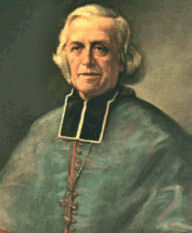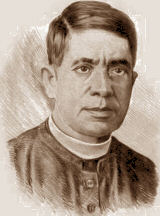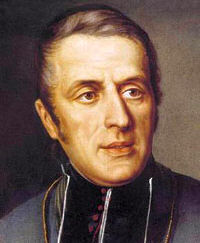Catholic Culture
Daily Readings for: May 21, 2013
(Readings on USCCB website)
Collect: Almighty and eternal God, who made the Priest Saint Christopher Magallanes and his companions faithful to Christ the King even to the point of martyrdom, grant us, through their intercession, that, persevering in confession of the true faith, we may always hold fast to the commandments of your love. Through our Lord Jesus Christ, your Son, who lives and reigns with you in the unity of the Holy Spirit, one God, for ever and ever.
RECIPES
ACTIVITIES
PRAYERS
LIBRARY
Ordinary Time: May 21st
Optional Memorial of St. Christopher Magallanes, priest and martyr, and his companions, martyrs; Optional Memorial of St. Eugene de Mazenod, bishop (Canada)
In 1815, St. Eugene de Mazenod founded the Congregation of the Oblates of Mary Immaculate to evangelize the poorest populations of Provence that were being neglected. He then sent his missionaries to proclaim the Gospel in America, South Africa and Asia. Later on, he was appointed Vicar General of Marseilles and, in 1836, Bishop of this same diocese. Until his death on May 21, 1861, he was at the service of his people with an extraordinary pastoral charity, nourished by an intense interior life. In his city, rapidly developing at the time, he created numerous parishes, built new churches and installed new Religious Institutes. — Cardinal Bernard Gantin
Saint Christopher Magallanes was joined in martyrdom by twenty-one diocesan priests and three devout laymen, all members of the Cristeros movement, who rose up in rebellion against the anti-Catholic Mexican government during the 1920s. Having erected a seminary at Totatiche, he secretly spread the Gospel and ministered to the people. Captured by government authorities, he was heard to shout from his jail cell: "I am innocent and I die innocent. I forgive with all my heart those responsible for my death, and I ask God that the shedding of my blood serve the peace of our divided Mexico." This optional memorial is new to the USA liturgical calendar and will be inscribed on May 21.
St. Eugene de Mazenod
 St. Eugene De Mazenod, refused to follow the established modes expected of someone born into nobility. From an early age, Eugene was troubled by the living conditions of the poor and their degraded status in society. When he became a priest, Eugene was not satisfied to accept the traditional role of a pastor serving a large, affluent parish. Instead, he sought out the poor laborers and preached the message of God’s love — a message they had not heard before.
St. Eugene De Mazenod, refused to follow the established modes expected of someone born into nobility. From an early age, Eugene was troubled by the living conditions of the poor and their degraded status in society. When he became a priest, Eugene was not satisfied to accept the traditional role of a pastor serving a large, affluent parish. Instead, he sought out the poor laborers and preached the message of God’s love — a message they had not heard before.
Born in France in 1782, Eugene lived amid turmoil in his country and in his family. Although he grew up with the privileges and luxuries of wealth, his family life was far from ideal. His parents came from very different backgrounds and they eventually divorced, a rarity for Catholics in the 18th century.
As the French Revolution grew, Eugene’s family was forced into exile, and at different times, he was separated from his mother or father for years at a time.
After years of struggling to find his place in life, Eugene experienced a conversion at the age of 25 and entered the seminary. He was ordained a priest in 1811. In 1816, Eugene invited others to join in his ministry to the poor and founded the Missionary Oblates of Mary Immaculate. Since that time, thousands of Oblate priests and brothers have dedicated their lives to serving those most in need. He died on May 21, 1861.
On December 3, 1995, Pope John Paul II canonized Eugene De Mazenod a saint and recognized his example of untiring dedication to the poor.
— Excerpted from Missionary Oblates of Mary Immaculate Website
Patron: Dysfunctional families.
Things to Do:
St. Christopher Magallanes and Companions
 Like Blessed Miguel Agustin Pro, S.J. (November 23), Cristobal and his twenty-four companion martyrs lived under a very anti-Catholic government in Mexico, one determined to weaken the Catholic faith of its people. Churches, schools and seminaries were closed; foreign clergy were expelled. Cristobal established a clandestine seminary at Totatiche, Jalisco. Magallanes and the other priests were forced to minister secretly to Catholics during the presidency of Plutarco Calles (1924-1928).
Like Blessed Miguel Agustin Pro, S.J. (November 23), Cristobal and his twenty-four companion martyrs lived under a very anti-Catholic government in Mexico, one determined to weaken the Catholic faith of its people. Churches, schools and seminaries were closed; foreign clergy were expelled. Cristobal established a clandestine seminary at Totatiche, Jalisco. Magallanes and the other priests were forced to minister secretly to Catholics during the presidency of Plutarco Calles (1924-1928).
All of these martyrs except three were diocesan priests. David, Manuel and Salvador were laymen who died with their parish priest, Luis Batis. All of these martyrs belonged to the Cristero movement, pledging their allegiance to Christ and to the church that he established to spread the Good News in society—even if Mexico's leaders had made it a crime to receive baptism or celebrate the Mass.
These martyrs did not die as a single group but in eight Mexican states, with Jalisco and Zacatecas having the largest number. They were beatified in 1992 and canonized eight years later.
— Excerpted from Saint of the Day, Leonard Foley, O.F.M.
30. And they departed thence, and passed through Galilee; and he would not that any man should know it.
31. For he taught his disciples, and said to them, The Son of man is delivered into the hands of men, and they shall kill him; and after that he is killed, he shall rise the third day.
32. But they understood not that saying, and were afraid to ask him.
33. And he came to Capernaum: and being in the house he asked them, What was it that you disputed among yourselves by the way?
34. But they held their peace: for by the way they had disputed among themselves, who should be the greatest.
35. And he sat down, and called the twelve, and said to them, If any man desire to be first, the same shall be last of all, and servant of all.
36. And he took a child, and set him in the midst of them: and when he had taken him in his arms, he said to them,
37. Whoever shall receive one of such children in my name, receives me: and whoever shall receive me, receives not me, but him that sent me.
THEOPHYL. It is after miracles that the Lord inserts a discourse concerning His Passion, lest it should be thought that He suffered because He could not help it; wherefore it is said, And they departed thence, and passed through Galilee: and he would not that any man should know it.
For he taught his disciples, and said to them, The Son of man is delivered into the hands of men, and they shall kill him.
BEDE; He always mingles together sorrowful and joyful things, that sorrow should not by its suddenness frighten the Apostles, but be borne by them with prepared minds.
THEOPHYL. After, however, saying what was sorrowful, He adds what ought to rejoice them; wherefore it goes on: And after that he is killed, he shall rise the third day; in order that we may learn that joys come on after struggles. There follows: But they understood not that saying, and were afraid to ask him.
BEDE; This ignorance of the disciples proceeds not so much from slowness of intellect, as from love for the Savior, for they were as yet carnal, and ignorant of the mystery of the cross, they could not therefore believe that He whom they had recognized as the true God, was about to die; being accustomed then to hear Him often talk in figures, and shrinking from the event of His death, they would have it, that something was conveyed figuratively in those things, which he spoke openly concerning His betrayal and passion. It goes on: And he came to Capernaum.
PSEUDO-JEROME; Capernaum means the city of consolation, and agrees with the former sentence, which He had spoken: And after that he is killed, he shall arise the third day. There follows: And being in the house he asked them, What was it that you disputed among yourselves by the way?
But they held their peace.
PSEUDO-CHRYS. Matthew however says, that the disciples came to Jesus, saying, Who is the greatest in the kingdom of heaven? The reason is, that he did not begin the narrative from its commencement, but omitted our Savior's knowledge of the thoughts and words of His disciples; unless we understand Him to mean, that even what they thought and said, when away from Christ, was said to Him, since it was as well known to Him as if it had been said to Him. It goes on: For by the way they had disputed among themselves, who should be the greatest. But Luke says, that "the thought entered into the disciples which of them should be the greatest"; for the Lord laid open their thought and intention from their private discourse, according to the Gospel narrative.
PSEUDO-JEROME; It was fit also that they should dispute concerning the chief place by the way the dispute is like the place where it is held; for lofty station is only entered upon to be quitted: as long as a man keeps it, it is slippery, and it is uncertain at what stage, that is, on what day it will end.
BEDE, The reason why the dispute concerning the chief place arose amongst the disciples seems to have been, that Peter, James, and John, were led apart from the rest into the mountain, and that something secret was there entrusted to them, also that the keys of the kingdom of heaven were promised to Peter, according to Matthew. Seeing however the thoughts of the disciples, the Lord takes care to heal the desire of glory by humility; for He first, by simply commanding humility, admonishes them that a high station was not to be aimed at. Wherefore it goes on: And he sat down, and called the twelve, and said to them, If any man desire to be first, the same shall be last of all, and servant of all.
JEROME; Where it is to be observed, that the disciples disputed by the way concerning the chief place, but Christ Himself sat down to teach humility; for princes toil while the humble repose.
PSEUDO-CHRYS. The disciples indeed wished to receive honor at the hands of the Lord; they also had a desire to be made great by Christ, for the greater a man is, the more worthy of honor he becomes, for which reason He did not throw an obstacle in the way of that desire, but brought in humility.
THEOPHYL. For His wish is not that we should usurp for ourselves chief places, but that we should attain to lofty heights by lowliness. He next admonishes them by the example of a child's innocence; wherefore there follows: And he took a child, and set him inn the midst of them.
CHRYS. By this very sight, persuading them to humility and simplicity; for this little one was pure from envy and vain glory, and from a desire of superiority. But He does not only say, If you become such, you shall receive a great reward, but also, if you will honor others, who are such for my sake. Wherefore there follows: And when he had taken him in his arms, he said to them, Whoever shall receive one of such children in my name, receives me.
BEDE; By which, He either simply shows, that those who would become greater must receive the poor of Christ in honor of Him, or He would persuade them to be in malice children, to keep simplicity without arrogance, charity without envy, devotedness without anger. Again, by taking the child into His arms, He implies that the lowly are worthy of His embrace and love. He adds also, In my name, that they might, with the fixed purpose of reason, follow for His names sake that mold of virtue to which the child keeps, with nature for his guide. And because He taught that He Himself was received in children, lest it should be thought that there was nothing in Him but what was seen, he added, And whoever shall receive me, receive not me, but Him that sent me; thus wishing, that we should believe Him to be of the same nature and of equal greatness with His Father.
THEOPHYL. See, how great is humility, for it wins for itself the indwelling of the Father, and of the Son, and also of the Holy Ghost.
Catena Aurea Mark 9


 St. Eugene De Mazenod, refused to follow the established modes expected of someone born into nobility. From an early age, Eugene was troubled by the living conditions of the poor and their degraded status in society. When he became a priest, Eugene was not satisfied to accept the traditional role of a pastor serving a large, affluent parish. Instead, he sought out the poor laborers and preached the message of God’s love — a message they had not heard before.
St. Eugene De Mazenod, refused to follow the established modes expected of someone born into nobility. From an early age, Eugene was troubled by the living conditions of the poor and their degraded status in society. When he became a priest, Eugene was not satisfied to accept the traditional role of a pastor serving a large, affluent parish. Instead, he sought out the poor laborers and preached the message of God’s love — a message they had not heard before.  Like Blessed Miguel Agustin Pro, S.J. (November 23), Cristobal and his twenty-four companion martyrs lived under a very anti-Catholic government in Mexico, one determined to weaken the Catholic faith of its people. Churches, schools and seminaries were closed; foreign clergy were expelled. Cristobal established a clandestine seminary at Totatiche, Jalisco. Magallanes and the other priests were forced to minister secretly to Catholics during the presidency of Plutarco Calles (1924-1928).
Like Blessed Miguel Agustin Pro, S.J. (November 23), Cristobal and his twenty-four companion martyrs lived under a very anti-Catholic government in Mexico, one determined to weaken the Catholic faith of its people. Churches, schools and seminaries were closed; foreign clergy were expelled. Cristobal established a clandestine seminary at Totatiche, Jalisco. Magallanes and the other priests were forced to minister secretly to Catholics during the presidency of Plutarco Calles (1924-1928). 
 Lord God, Author of Life and Source of Eternal Life,
Lord God, Author of Life and Source of Eternal Life,